
Last night on Monday Night RAW, RETRIBUTION finally made themselves known, as it was revealed that five of the faction's members had "signed" with the company. SLAPJACK, T-BAR and MACE, along with two female individuals, made quick work of WWE's other faction of the moment, The Hurt Business.
RETRIBUTION's big moment hasn't exactly been well received, either by fans or the folks backstage, but the group still has a lot of potential. How could it not when it boasts talent like Mia Yim, Dominik Dijakovic and Mercedes Martinez? So, we'll just have to wait and see if this team fizzles or sizzles.
On the other hand, we can certainly mention five other factions from WWE history that really just let everybody down. So, that's what we're going to do. The five most disappointing factions in WWE history.
10 WWE Stars Who Are Now Banned - Find Out Now!
Before diving into it, an honorable mention goes to the WCW/ECW Alliance from 2001. While the entire angle was a big let down all around, they were just too big to be a "faction". They were also presented as their own company, as opposed to a group of wrestlers signed with WWE.
#5 WWE missed a great chance with Nexus
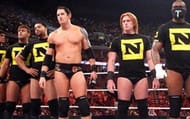
Back in 2010, WWE debuted a new show called NXT, except this first time around, it was essentially a game show. It featured eight of WWE's developmental talent which, at the time, were based in Florida Championship Wrestling. They would compete in matches, physical challenges and other competitions. Each week, at least one contestant was eliminated via an audience vote. No, seriously.
The winner, which at the end of season one was Wade Barrett, would be awarded a main roster WWE contract and a WWE Championship match. The other seven guys would just... go back to what they were doing.
Except they didn't...
On the June 7th, 2010 episode of WWE RAW, Daniel Bryan, David Otunga, Heath Slater, Darren Young and others interrupted a match between John Cena and CM Punk. They would go on to basically destroy everything around them. It was amazing.
This was the beginning of one of the most fascinating and exciting stories WWE had put together in years. The Nexus, as they were known, would run roughshod across the company for weeks, attacking anybody they saw backstage.
It all led to a confrontation at SummerSlam that year, as the remaining seven members of Nexus took on seven WWE stars including Bryan, who had been rehired after his release.
Team WWE won, with John Cena getting the winning submission on Wade Barrett and effectively killing all of the faction's momentum.
The Nexus should have been the biggest thing in wrestling for years. While members like Barrett, Bryan, Slater, Young and David Otunga would all go on to, at the very least hold a championship in the company, the group itself simply failed to live up to its potential.
Barrett would then go on to start a spin-off group (more on them in a minute), CM Punk would take over leadership and Nexus would eventually fade away.
#4 The Corre gained little momentum in WWE
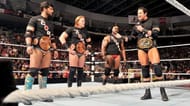
To this day, what this name is supposed to signify is still unknown. It may be the most confusing faction name in WWE history.
When leadership of Nexus moved to CM Punk, Wade Barrett moved to SmackDown. On the January 14th, 2011 episode, Justin Gabriel and Heath Slater met him there and, along with Ezekiel Jackson, formed their own group. The group was declared leaderless and they were now a group of equals.
It was the addition of the powerhouse Jackson that made this faction intriguing, as he was being primed by WWE to be something of a competent Ahmed Johnson. Eventually, however, it would be Jackson that was the first member to split from the group. But not before it had some minor success.
Gabriel and Slater would win the WWE Tag Team Championships from Santino Marella and Vladimir Kozlov. Wade Barrett would also win his first WWE Intercontinental Championship from Kofi Kingston.
The Corre would also throw down with other factions in WWE, including brawls with Nexus and A.P.P.L.E., a group consisting of Marella, Evan Bourne, Daniel Bryan and Mark Henry.
That particular faction, whose name stood for the Alliance of People Powered by Loathing Everything you stand for (no, seriously), only lasted one day. In case you were wondering why they weren't on this list as well.
Eventually, however, the group simply failed to gain any traction and following Jackson's departure, Slater and Gabriel would split off from Barrett, ending the group's WWE tenure entirely.
#3. The Union fizzled away in WWE's greatest era
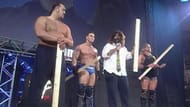
Ah, the Attitude Era. WWE's most successful era. And they've had a lot of eras.
Outside of D-Generation X, the two biggest factions in WWE at that time were The Corporation (led by either Vince or Shane McMahon) or the Ministry of Darkness (The Undertaker's collection of goth miscreants). Those two groups would eventually merge into the Corporate Ministry, and that's where The Union comes in.
The Union was also known as U.P.Y.O.U.R.S. or Union of People You Oughtta Respect, Son (no, seriously). It was made up of Mankind, Ken Shamrock, Test and the Big Show, all of whom were previous members of the Corporation.
It was on May 3rd, 1999, less than a week after the Corporation and Ministry merged, when the four "disgruntled former employees" decided to take matters into their own hands.
They held sturdy 2x4 pieces of lumber into their hands and had this banger of a theme song, too.
Even Vince McMahon himself was a temporary member of the group, before it turned out he was the "higher power" behind the Corporate Ministry to begin with. By the end of that month, however, Mick Foley was in need of knee surgery and the group eventually fizzled away.
The team's name is interesting, considering the severe pushback the idea of pro wrestlers unionizing has usually been met with by promotions throughout the course of wrestling's history. We're not here to discuss that, but it bears mentioning at least.
Also, the main reason this group is at #3 is because we didn't want three WWE factions in a row featuring Wade Barrett. Poor guy.
#2. The League of Nations weren't accepted by the WWE Universe
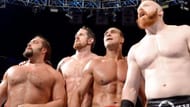
Anyone remember playing WWE '12 and going through the Road to WrestleMania mode? If you do, you'll probably recall a section in which you controlled Sheamus as he led a faction of his fellow countrymen. He led William Regal, Wade Barrett and Drew McIntyre in an attempt to do what all bad guy factions try to do, which is win all the titles and beat everybody up.
Yes, it was a video game, but it was awesome. And after the game came out, fans began to wonder "why can't WWE do something like this? This rules." And so, WWE did just that. Three years later. And not nearly as good.
Enter the League of Nations, consisting of Barrett, Alberto del Rio of Mexico, Sheamus of Ireland and Rusev of Bulgaria. On paper, it doesn't seem all that bad.
In 2015, all four of these guys were at the peak of their careers, even Del Rio wasn't a complete mess at that point. They even won their share of championships, with Del Rio winning the WWE United States title twice. Sheamus also successfully cashed in his Money In The Bank briefcase against Roman Reigns to win the WWE World Heavyweight Championship.
Reigns. There's the issue.
Roman Reigns is awesome, but at the time, WWE was really trying their hardest to make him their marquee good guy and... it wasn't going well. So, what better way to get him over than to have him go up against a slew of foreign heel wrestlers? Essentially, this group wasn't put together to tell a story, they were put together to try and make Roman more popular.
Sheamus, Rusev and Del Rio took on The New Day at WrestleMania 32 in a winning effort, only to be humiliated by Shawn Michaels, Stone Cold Steve Austin and Mick Foley afterwards.
The next night on RAW, the group kicked Barrett out before getting attacked by the Wyatt Family of all people.
The League of Nations were a group of really talented wrestlers who were put together for the wrong reasons. During an interview with Fightful, Rusev said:
"Theoretically, on paper, it could have been the best faction in history, but they never had a chance. They were there to be a punching bag for Roman Reigns, which is okay. We did great, we built him up and he went on to win the title [at WrestleMania] so we did our job right."
Nowadays, Rusev is known as Miro in AEW, Wade Barrett is on commentary for NXT, Sheamus is still in WWE's mid-card after a successful tag team run with Cesaro as The Bar, and del Rio? Yeah. The less said about him, the better.
#1. The New World Order arrived in WWE from WCW
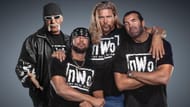
Following the Invasion story in 2001, WWE essentially said "well, now that's over with, let's start bringing in WCW's actual big name."
OK, it was a little more complicated than that. There were contracts, egos and whatnot involved, but the fact is that following Survivor Series 2001, WCW's most recognizable stars began to trickle into WWE. It all started with the Nature Boy.
The night after Survivor Series on RAW, it was revealed that Ric Flair was, through reasons we don't have time to go into right now, a 50% co-owner of WWE along with Vince McMahon.
As the story went on, McMahon decided that he would rather see his company destroyed than in the hands of Flair any longer. Thus, he decided to inject it with a lethal dose of pooooison...
And that lethal dose of poison? The New World Order.
"Hollywood" Hulk Hogan, Scott Hall and Kevin Nash were back in WWE and, much like they seemingly tried to do in WCW, they were there to kill the company. For fans who were let down by the Invasion's lack of big stars, this was pretty exciting.
Then, WrestleMania X8 came around. Hall lost to Steve Austin and Hogan lost to The Rock. Hollywood would find himself ousted from the group after shaking The Rock's hand following the match. Not long after, Sean "X-Pac" Waltman was brought into the group and Hall was kicked out - in reality, he had asked for his release.
The WWE nWo would see new members such as Booker T, Big Show, Ric Flair and even Shawn Michaels, the only nWo member to have never wrestled for WCW, join the ranks. Eventually though, the group just didn't work.
On July 5th, 2002, following an injury to Kevin Nash, Vince McMahon came to the ring on RAW and announced the nWo were no more. He added that former WCW President Eric Bischoff was the new General Manager of RAW.
The nWo coming to WWE was something the audience hadn't expected, even after the company purchased WCW. Sadly, the way it was implemented just didn't pan out very well. Still, it led to a pretty cool run for Hogan which saw him win the WWE Championship one last time.
Since then, the nWo have made a number of appearances on WWE TV, including at WrestleMania 31 to back up Sting in his match against Triple H. If it hasn't been for COVID-19, they would have been inducted into the WWE Hall of Fame around WrestleMania time too.
Considering they were probably the biggest faction in pro wrestling during their WCW days, it's especially disappointing how they eventually turned out in WWE. That's why they top this list.
What do you guys think? Are there any other factions that you feel were a huge let down? Let us know in the comments section down below.
Make Sportskeeda your preferred choice for WWE content by clicking here: Source preferences

